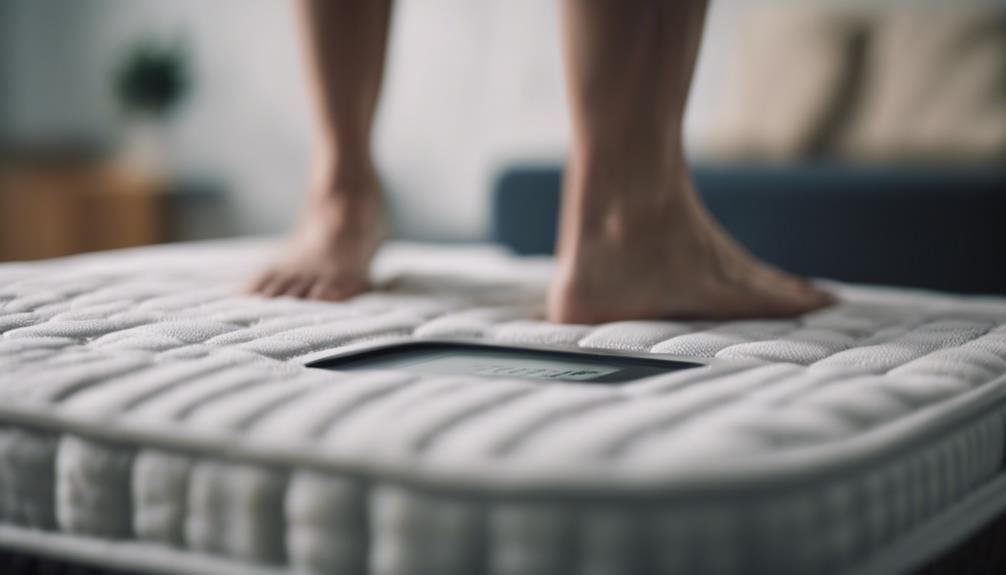When it comes to choosing the right mattress firmness, you might feel overwhelmed by the variety of options available. However, understanding a few key factors can simplify your decision. Consider your sleep position, as whether you sleep on your side, back, or stomach plays a vital role in determining your firmness needs. Your body weight also plays an important role in determining the right level of support and cushioning. But that's just the beginning; other elements like spinal alignment and partner preferences also come into play. So, what should you focus on next to make the best choice for restful nights?
Key Takeaways
- Match mattress firmness with your primary sleep position for optimal comfort and support.
- Consider your body weight to ensure proper support and minimize sinkage.
- Test mattresses in-store to experience different firmness levels firsthand.
- Consult sleep experts for personalized recommendations based on your sleep habits.
- Communicate with your partner to find a compromise that suits both preferences.
Understand Mattress Firmness Levels
When you're choosing a mattress, understanding its firmness levels is vital for ensuring a good night's sleep. Mattress firmness ranges from soft (3-6) to firm (7 and higher) on a scale of 1 to 10. Soft mattresses provide deep sinkage and body contouring, which can help alleviate pressure points. However, they might lack the necessary support for proper spinal alignment, especially if you have a heavier body weight.
Firm mattresses, on the other hand, are highly supportive but don't offer the same plush feel. The firmness level you choose should align with your sleeping position and body weight. For instance, if you're lighter, a softer mattress might provide adequate support without compromising comfort. Conversely, if you're heavier, a firmer mattress will likely offer better spinal alignment and support.
It's essential to distinguish between firmness and support. Firmness is how the mattress feels initially, while support refers to its ability to maintain spinal alignment throughout the night. Balancing these factors is key for sleeping inspiration and overall sleep quality.
Identify Your Sleep Position
Identifying your primary sleep position is essential for selecting the right mattress firmness. Your sleep position affects how your body interacts with the mattress, impacting spinal alignment and pressure relief.
Here's a quick guide to help you identify your sleep position and choose the ideal mattress firmness:
- Side Sleepers: You typically need a softer mattress (around 3-6 on the firmness scale). This helps to cushion your shoulders and hips, promoting proper spinal alignment and providing much-needed pressure relief.
- Back Sleepers: A medium-firm to slightly firm mattress (around 6-7) is usually best. It offers enough support to keep your spine aligned without being too hard on your back.
- Stomach Sleepers: You should look for a medium-firm to firm mattress (around 6-8). This firmness level helps prevent your back from overarching, ensuring better spinal alignment.
- Combination Sleepers: If you switch positions throughout the night, a medium-firm mattress can provide a balanced mix of support and comfort for all sleep positions.
Consider Your Body Weight

When selecting mattress firmness, you should consider your body weight, as it directly influences the support and comfort you'll experience.
Lighter individuals often prefer softer mattresses for adequate cushioning, while those over 230 pounds typically need firmer options to prevent excessive sinkage.
Weight and Firmness Correlation
Your body weight plays a pivotal role in determining the ideal mattress firmness for both comfort and support. The right firmness level can help you achieve optimal spinal alignment, ensuring you wake up refreshed and pain-free.
Let's explore how your body weight influences mattress choice:
- Heavier individuals (over 230 pounds) typically need firmer mattresses. Firmer mattresses provide better support and minimize sinkage, which is essential for maintaining comfort and spinal alignment.
- Lighter individuals often find softer mattresses more comfortable. Softer mattresses offer better pressure relief and comfort, preventing discomfort in areas like the shoulders and hips.
Your weight affects how much sinkage and support a mattress provides. A mattress that's too soft for a heavier person might lead to excessive sinkage, while a mattress that's too firm for a lighter person mightn't offer adequate pressure relief.
Considering your body weight when selecting mattress firmness ensures you get the right balance of support and comfort.
Impact on Sleep Quality
Choosing the correct mattress firmness based on your body weight greatly enhances your sleep quality. Your body weight greatly influences how much support and comfort you need.
Lighter individuals, especially those under 130 pounds, often prefer softer mattresses. These provide better pressure relief and prevent discomfort, particularly for side sleepers who need cushioning around their shoulders and hips.
On the other hand, if you weigh over 230 pounds, firmer support is essential. A firmer mattress helps maintain proper spinal alignment, reducing the risk of back pain. It also prevents excessive sinking, which can lead to discomfort and inadequate support.
This is especially important regardless of your sleeping position, as maintaining the natural curve of your spine is key to a restful night's sleep.
Evaluate Spinal Alignment
Assessing spinal alignment is crucial to guarantee that your mattress supports the natural curvature of your spine.
You'll need to find a firmness that alleviates pressure points, especially if you're a side sleeper.
A mattress that promotes proper alignment can reduce discomfort and enhance your sleep quality.
Natural Spine Curvature
Ensuring your mattress supports the natural S-curve of your spine is vital for maintaining proper spinal alignment and reducing discomfort. When your mattress aligns with your spine curvature, it helps maintain natural alignment, which can greatly reduce back pain. The right mattress firmness plays a critical role in supporting your spine and its natural curves, ultimately helping to enhance sleep quality.
To choose the right mattress firmness, consider these key points:
- Spine Curvature: Your spine has a natural S-curve that needs support. A mattress that's too soft or too firm can disrupt this alignment.
- Proper Spinal Alignment: Maintaining proper spinal alignment ensures your muscles and joints are relaxed, reducing the risk of aches and pains.
- Back Pain Reduction: A mattress supporting your spine's natural alignment can significantly lessen back pain, allowing for a more restful sleep.
- Enhanced Sleep Quality: Correct spinal support helps you wake up refreshed and rejuvenated, enhancing overall sleep quality and well-being.
Selecting a mattress that supports your spine's natural alignment is key to reducing back pain and enjoying better sleep. Proper spinal alignment isn't just about comfort—it's about health.
Pressure Point Relief
Proper mattress firmness plays a pivotal role in alleviating pressure points and promoting spinal alignment. When evaluating spinal alignment, it's essential to determine if your mattress provides adequate pressure point relief. Soft mattresses can contour to your body, reducing pressure on sensitive areas like your shoulders and hips. This is especially important for side sleepers, who often face discomfort in these zones.
On the other hand, firm mattresses may not offer sufficient pressure point relief, which can lead to increased discomfort and disrupted sleep quality.
To choose the proper mattress firmness, you need to take into account your sleeping position and body type. Side sleepers typically benefit from softer mattresses that cushion the shoulders and hips, helping to alleviate pressure points and maintain proper spinal alignment. However, if the mattress is too soft, it mightn't support your spine adequately.
Conversely, firm mattresses can be beneficial for back and stomach sleepers, but they mightn't alleviate pressure points effectively for side sleepers, leading to discomfort.
Ultimately, selecting the right firmness level is key to minimizing discomfort and enhancing your sleep quality. By addressing pressure points and ensuring your spine remains properly aligned, you'll enjoy more restful and rejuvenating sleep.
Test Mattresses In-Store

Testing mattresses in-store lets you directly experience the firmness levels and comfort they offer. When you test mattresses in-store, you can assess body support and determine how different firmness levels feel against your body.
Trying out mattresses in-person gives you a tangible sense of their comfort and support, which is something descriptions and online reviews can't fully convey. Physical testing helps you make an informed decision on the ideal firmness for your needs, allowing you to experience the difference between soft, medium, and firm mattresses.
Here are a few tips to make the most out of your in-store mattress testing:
- Lie down in your usual sleep position: This helps you understand how the mattress will support you throughout the night.
- Spend at least 10-15 minutes on each mattress: Give your body time to adjust and truly feel the mattress's firmness levels.
- Bring your own pillow: Using your regular pillow can give you a more accurate sense of comfort and support.
- Wear comfortable clothing: This allows you to move freely and feel the mattress without distractions.
Consult Sleep Experts
Consulting sleep experts can provide you with tailored advice on selecting the perfect mattress firmness for your specific needs.
Experts like Derek Hales from NapLab offer valuable insights based on factors such as your weight, sleeping position, and personal preferences.
When you seek guidance from sleep experts, you gain access to personalized mattress quizzes that can help pinpoint the ideal firmness level for you.
These quizzes are designed to assess your unique sleep habits and requirements, making it easier to choose a mattress that will enhance your sleep quality.
Expert guidance is especially beneficial when exploring the wide range of firmness options available in the mattress market.
With so many choices, it can be challenging to decide what's best for you.
Factor in Partner Preferences

When choosing mattress firmness, it's important to factor in both your preferences and those of your partner. Both individuals have unique needs, and finding a balance between comfort and support is essential. Start by discussing each other's preferred sleeping positions and firmness levels.
Open communication and compromise will help you identify a mattress that suits both of you.
A medium-firm mattress often provides a good balance between comfort and adequate support, catering to a wide range of preferences. However, if you and your partner have notably different firmness needs, look for mattresses with customizable firmness settings. These options allow you to adjust each side of the mattress independently, ensuring both individuals get the desired level of comfort.
Here are some tips to consider:
- Discuss your sleeping preferences: Take time to understand what each of you needs for a good night's sleep.
- Opt for a medium-firm mattress: This type generally balances comfort and support effectively.
- Consider customizable firmness settings: Mattresses with adjustable firmness can cater to both partner preferences.
- Prioritize communication and compromise: Working together will help you find the best solution for both.
Frequently Asked Questions
How Do I Know What Mattress Firmness Is Right for Me?
To determine the right mattress firmness for you, start by considering your sleeping position. Side sleepers often prefer softer mattresses, back sleepers like medium-firm, and stomach sleepers need firmer support.
Your body weight also matters; lighter individuals usually enjoy softer mattresses, while heavier folks need firmer ones.
Test different firmness levels, use online tools for guidance, and consult with experts for personalized advice. Don't be afraid to try before you buy!
What Firmness Is Best for Side Sleepers?
For side sleepers, a mattress with a firmness level of 3-6 is ideal. You should opt for a medium to medium-soft mattress to guarantee proper body contouring and pressure relief.
This helps maintain spinal alignment and reduces pressure points in your shoulders and hips, enhancing overall comfort.
Prioritizing a balance of softness and support will prevent morning stiffness and promote a better night's sleep.
How Do You Tell if Bed Is Too Firm or Too Soft?
To tell if your bed is too firm or too soft, pay attention to how you feel when you wake up. If you've got back or neck pain, your mattress might be too soft.
If you feel discomfort sleeping on your side or have shoulder pain, it's probably too firm. Excessive sinkage indicates softness, while a lack of support shows firmness.
Listen to your body's signals.
What Level of Firmness Is Best for Back Sleepers?
For back sleepers, medium-firm to firm mattresses are ideal.
You'll find a medium-firm mattress (6-7 on the firmness scale) offers the best balance of support and comfort, ensuring proper spinal alignment.
If you prefer a more supportive feel, opt for a firm mattress (7 and higher).
Choosing the right firmness level is essential to alleviate back pain and provide a restful sleep experience.
Are the 7 Tips for Choosing Mattress Firmness Still Relevant Compared to the 10 Best Tips?
When it comes to finding the best mattress for your needs, the 7 best mattress firmness tips are still relevant, even when compared to the 10 best tips. Understanding your sleep position and personal preferences is essential for choosing the right firmness level for a comfortable and restful night’s sleep.
Conclusion
When determining the perfect mattress firmness, you'll need to take into account your sleep position, body weight, and spinal alignment. Be sure to test out mattresses in-store and seek advice from sleep experts for personalized recommendations.
Keep in mind your partner's preferences as well, aiming for a medium-firm option that provides both comfort and support.
By following these tips, you're well on your way to a restful and rejuvenating night's sleep. Happy mattress shopping!

